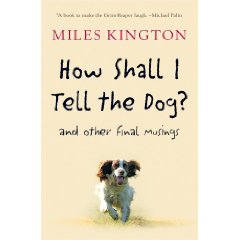Books |
How Shall I Tell the Dog? And Other Final Musings
Miles Kington
By
Published: Jun 22, 2009
Category:
Memoir
Don’t feel bad because you’ve never heard of Miles Kington. You’re not a Brit. And you don’t read London newspapers.
Brits and London newspaper devotees know all about Kington. He wrote humorous pieces for Punch, moved on to The Times, and then spent 22 years writing for The Independent. He filed a humor piece every day, more than 4,500 pieces in all — he was the Iron Man of English humor.
Then the Iron Man got pancreatic cancer. He told no one outside of his family. (From an e-mail to a friend: "I haven’t been well. I am trying out a new disease for The Independent".) He just kept on writing; his last piece ran the day before he died, in 2008, at 66. (In his 22 years at The Independent, he never once visited the office, thus earning this unlikely praise from his editor: “I can honestly say that Miles is one of the few writers who has been no more trouble in death than he ever was in life.”)
Kington was also a jazz critic. And a book writer, most notably the “Parlez Vous Franglais” series. Clever guy that he was, he wrote a book while he was dying.
How Shall I Tell the Dog? And Other Final Musings is not like any book about cancer you have seen, or will. It’s a series of letters, all to his agent, Gill Coleridge, wondering how he can turn his latest obsession — his collision course with death — into money. “Mind you, I think phrases like ‘cashing in on cancer’ give quite the wrong impression.” he writes, “What I mean is, ‘making cancer work for its living’.”
His disease makes him obsessed with theme and titles for his book.
“1,000 Places to see Before You Die” — for people like him, he could do a book with just 100 places.
Or “Cancer, the IFAQs”, being the infrequently asked questions about cancer. (“The things about cancer that nobody tells you, because you’ve never asked and they wouldn’t know the answer anyway. Like: Who is the patron saint of cancer?”)
Maybe he could write an uplifting take on the power of self-pity.
Here’s a title: “I Was Sorry to Hear About Your… Your …Your…”
Maybe a book for children. (“What’s wrong with Daddy, Mummy?” “Ssshh, dear. Daddy’s dying of cancer.”)
A funeral video, starring himself. Unlikely, though, for a freelance writer: “When he died, he was still working on his farewell speech.”
And, of course, how do you tell your dog?
There’s more. The irony of the shrinking waistline. Famous last words. Becoming an unlikely assassin and taking out ….oh…how about Rupert Murdoch? Friends you call out of the blue and don’t say which, because they don’t want anyone who know them to guess that they’re dying.
The humor, of course, is just gloss for the wisdom:
When you’ve got cancer, and you feel it entitles you to start sentences with the rather flashy words, "When you’ve got cancer", it must be extremely irritating for all those other people who have not got cancer to hear us say, "When you have got cancer", as if it automatically makes us wiser or morally superior or more experienced in life or more dignified, whereas we are nothing of the sort. Just a bit more ill.
Miles Kington was a wise man. And, also, a wise guy. It’s a terrific combination.
To buy “How Shall I Tell the Dog” from Amazon.com, click here.


